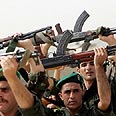
Palestinians demand regular army for new state
Optimistic developments touted after Olmert-Abbas meeting prove to hold little water as gaps between Israel, PA only seem to widen as negotiations go deeper. Behind closed doors, Israeli and Palestinian officials have confirmed to Ynet, PA negotiator Ahmed Qureia is demanding an army be built for future Palestinian nation
Despite previous understandings that a future Palestinian state would be demilitarized, Ynet has learned that in talks held behind closed doors, the top negotiator for the Palestinian Authority, Ahmed Qureia, is demanding the establishment of a regular army.
High-level Israeli and Palestinian officials confirmed the newly revealed developments on Monday night.
According to the information obtained by Ynet, the new and surprising demand first emerged as the negotiations teams sat down in Jerusalem last Sunday to discuss security arrangements. Qureia told Foreign Affairs Minister Tzipi Livni that the Palestinian state would require a regular army to defend itself.
Livni, though perplexed by the sudden demand, made clear that all previous accords specifically spoke of a demilitarized Palestinian state. A senior Israeli source said that Livni sought to clarify if perhaps Qureia had meant a Palestinian police force, but the latter was reiterated that it was a proper regular army the PA was after.
The source added that the new Palestinian stipulation incensed Livni, who ardently rejects the idea of such an army.

Palestinian policemen in Jenin. Soon to be soldiers? (Photo: Reuters)
A very senior Palestinian source close to Qureia confirmed the exchange. "At the meeting in question we raised the demand for a regular army, meant to defend the independent state," he told Ynet.
"This isn't an army intended to launch an attack against Israel. We are not asking for F-16 jets but rather a force that would be able to defend the nation from threat and realize its basic right to exist in security."
The source said the situation had changed greatly since the days of the Oslo Accords in 1993. "Oslo spoke of an intermediary entity. Now we are talking about a Palestinian state born out of a permanent agreement. There is no clause in any of the understandings that denies the Palestinian state an army to defend itself with, to defend its borders and citizens with," he said.
'What significant progress, exactly?"
Following the most recent meeting between Prime Minister Ehud Olmert and Palestinian President Mahmoud Abbas, a senior State official declared that "significant progress" had been made in negotiations on the final borders and security arrangements.
An Israeli official well-informed of the proceedings rejected that statement. "What significant progress are they talking about exactly?" he wondered.
"It's very clear that there are complex disagreements on all the core issues. Up until now the points of contention have been the borders and the matter of the refugees. And that was before you even got to Jerusalem. But now the Palestinians want an army of their own, without regard to any of the previous accords. This isn't progress, it's backtracking. Reports of progress in the negotiations are misleading the public."
But other officials connected to the talks taking place in backrooms think little of the Palestinians demand for a regular army. The Palestinians, they said, were well aware that in the event a Palestinian state will indeed be established, it will undoubtedly be demilitarized. Disagreements are an inherent part of negotiations, they said, but this does not mean the talks are stalled.
In her speech at the president's conference last week, Livni determinedly broached the subject: "Yes, it is important to set recognized borders, but that is not enough. We must determine what will be on the other side of that border.
"We are talking about a demilitarized state here (…) we will not stand for a terror state or an extremist Islamist state. There are conditions that will have to be met, before and after. I don't hold by just tossing the keys over the border and hoping for the best. There will be no agreement over the future territory if there won't be satisfactory assurances regarding what its nature will be."
Ali Waked contributed to this report










